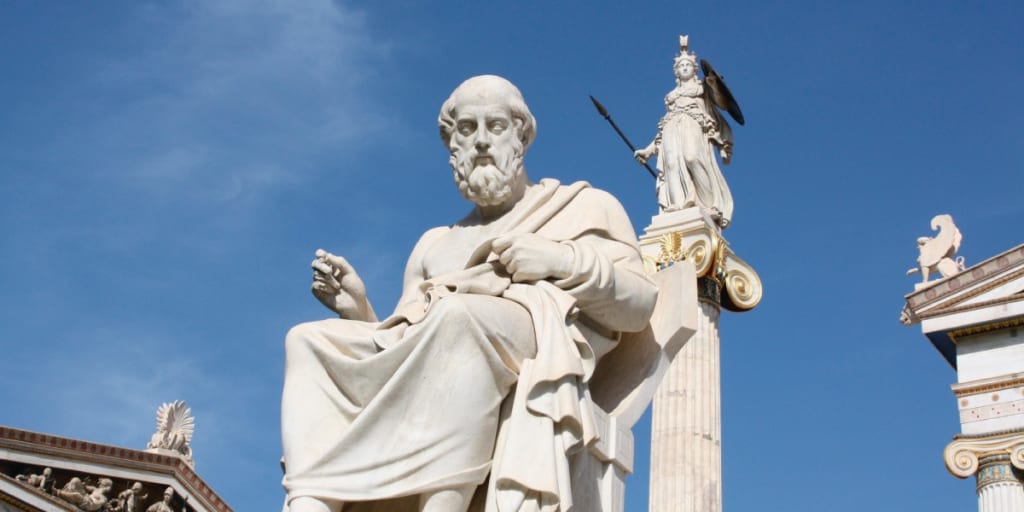"Exploring Plato's Eternal Truths: A Journey into the World of Forms, the Soul and the Philosopher-King"
Plato, a Greek philosopher who lived from 427-347 BCE, is considered one of the most important figures in the development of Western philosophy. He was a student of Socrates and the teacher of Aristotle, and his works have had a profound influence on the development of Western thought.

Plato, a Greek philosopher who lived from 427-347 BCE, is considered one of the most important figures in the development of Western philosophy. He was a student of Socrates and the teacher of Aristotle, and his works have had a profound influence on the development of Western thought.
Plato's philosophy is generally classified as idealism, and his most well-known theory is the theory of forms, which holds that non-material abstract forms, such as justice, equality, beauty, etc., are more real than the material objects we perceive. In this article, we will explore Plato's philosophical views in depth, including his theory of forms, belief in the immortality of the soul, and ideas about the ideal state and government.
The theory of forms is one of Plato's most central and enduring ideas. According to this theory, there are two realms: the realm of the sensible, which consists of the material world we experience through our senses, and the realm of the intelligible, which consists of non-material abstract forms such as justice, equality, and beauty. Plato believed that these forms are eternal and unchanging, and they are the source of all knowledge. He believed that our perceptions of the material world are limited and that true knowledge can only be attained through the contemplation of these forms.
For Plato, these forms were not simply abstract concepts, but they were the very essence of reality. He believed that these forms were the only true reality, and that the material world we experience was simply a reflection of these forms. Plato argued that the material world was an imperfect copy of the eternal and unchanging forms, and that our perceptions of the material world were limited and flawed. To truly understand reality, one must turn away from the material world and contemplate the forms.
Plato believed that the soul pre-exists the body and continues to exist after the body dies.
He also believed that the soul is divided into three parts: the rational, spirited, and appetitive.
The rational part of the soul is immortal and can attain knowledge of the forms, while the spirited and appetitive parts are mortal and are responsible for our desires and emotions. Plato believed that the soul's ultimate goal is to achieve knowledge of the forms and that the body is simply a temporary vessel for the soul.
In addition to his belief in the immortality of the soul, Plato also believed in the idea of innate knowledge. He believed that all knowledge is already present within us and that we simply need to access it. He believed that the soul is able to access this knowledge through the contemplation of the forms. This idea of innate knowledge is closely related to Plato's theory of forms, as it suggests that the forms are not something that we must discover, but rather something that we already know.
Plato's philosophy also had a significant impact on the field of political philosophy. He believed that the ideal state would be ruled by philosopher-kings, individuals who have attained knowledge of the forms and are able to govern justly. He believed that this type of government would lead to a society that is just and harmonious. In his most famous work, "The Republic," Plato presents a vision of an ideal society in which philosopher-kings rule over a society of individuals who are divided into classes based on their abilities and interests.
In this ideal society, the ruling class is made up of philosopher-kings, who have attained knowledge of the forms and are able to govern justly. The second class is made up of soldiers, who are responsible for protecting the state. The third class is made up of farmers, artisans, and merchants, who are responsible for providing the basic necessities of life. The fourth and final class is made up of the lower class, who are not capable
About the Creator
Roman Weber
As a professional article writer, i have a strong passion for crafting compelling and informative pieces on a wide range of subjects. I have a broad range of knowledge and research skils that allow me to delve deep into any topic...






Comments
There are no comments for this story
Be the first to respond and start the conversation.